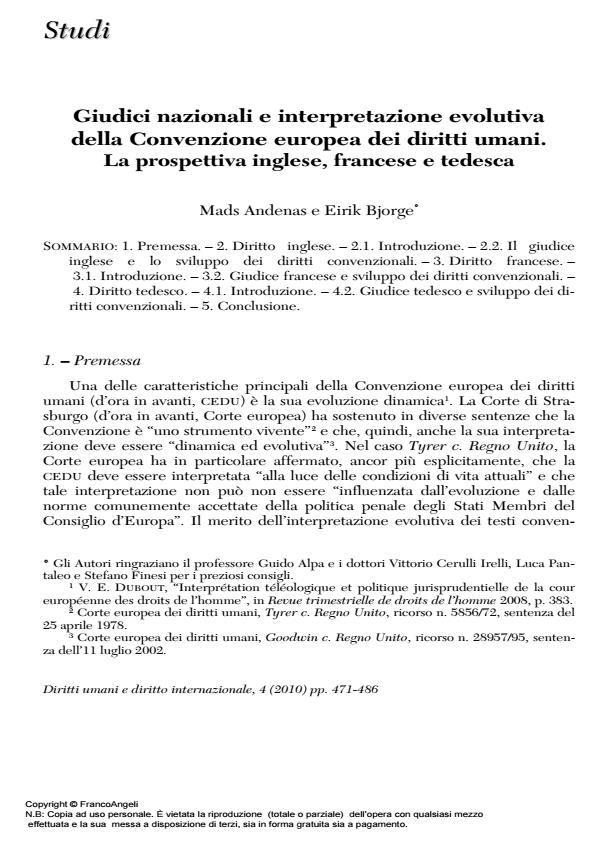The Evolutive Interpretation of the European Convention of Human Rights: English, French and German Perspectives
Journal title DIRITTI UMANI E DIRITTO INTERNAZIONALE
Author/s Mads Andenas, Eirik Bjorge
Publishing Year 2010 Issue 2010/3 Language Italian
Pages 16 P. 471-486 File size 461 KB
DOI 10.3280/DUDI2010-003001
DOI is like a bar code for intellectual property: to have more infomation
click here
Below, you can see the article first page
If you want to buy this article in PDF format, you can do it, following the instructions to buy download credits

FrancoAngeli is member of Publishers International Linking Association, Inc (PILA), a not-for-profit association which run the CrossRef service enabling links to and from online scholarly content.
One of the hallmarks of the European Convention on Human Rights is its so-called dynamic evolution. Equally exemplary of the Convention system, however, is the duty of member states to make sure their internal law stays abreast of the dynamic standards of the Convention. This in recent years has engendered the question of whether national supreme courts, too, ought to interpret the Convention standards dynamically, or whether this task is the preserve of the European Court of Human Rights. Should na-tional courts, in other words, play an active role in the development of the Convention, or must they defer this development to the Court? Looking at national supreme courts in the UK, France, and Germany, this study looks at this both normatively, by way of looking at the external exigencies of the Strasbourg jurisprudence, and descriptively, by way of looking at what the national courts have in fact done. The three national supreme courts studied here have approached this in various ways. The Supreme Court UK, and its forebear the House of Lords, has interpreted Convention rights in a way very much akin to dynamic interpretation in cases in which the Strasbourg Court has signalled that the national margin of appreciation is engaged. French courts have engaged in nothing short of full-fledged dynamic interpretation, taking stock of European development and then arriving at an interpretation which goes beyond Strasbourg. The contribution of German courts have been the very strong interpretation they have given of national rights, all the while taking their cues from the development of the Convention rights, thereby arguably influencing the latter.
Mads Andenas, Eirik Bjorge, Giudici nazionali e interpretazione evolutiva della Convenzione europea dei diritti umani. La prospettiva inglese, francese e tedesca in "DIRITTI UMANI E DIRITTO INTERNAZIONALE" 3/2010, pp 471-486, DOI: 10.3280/DUDI2010-003001